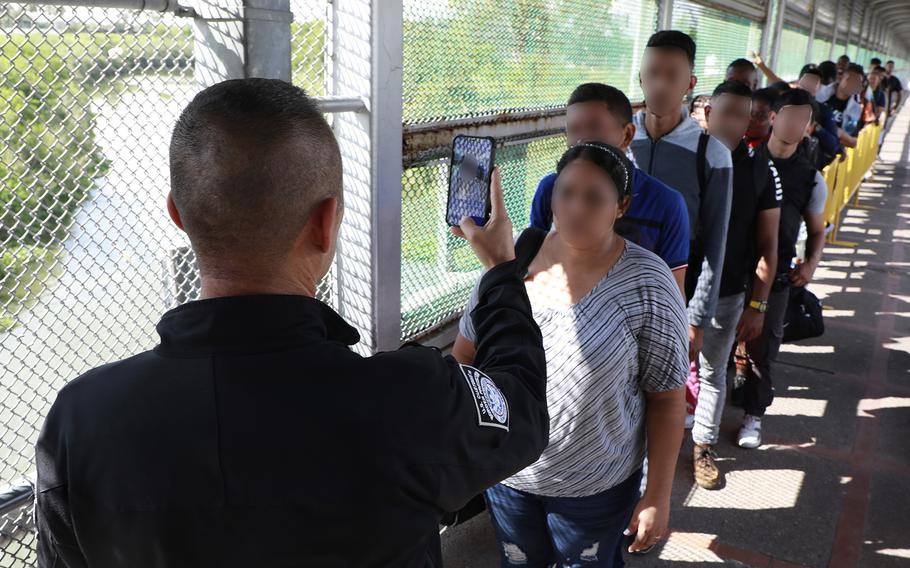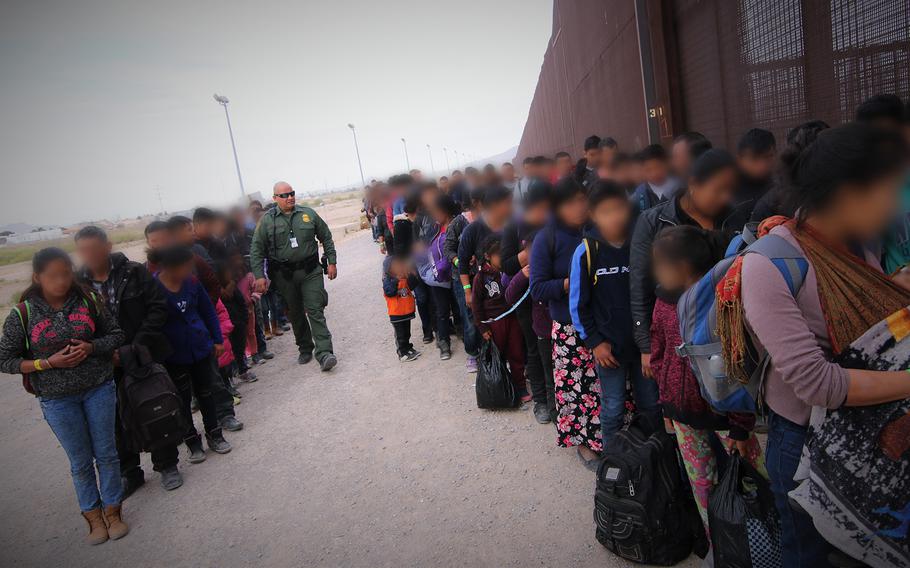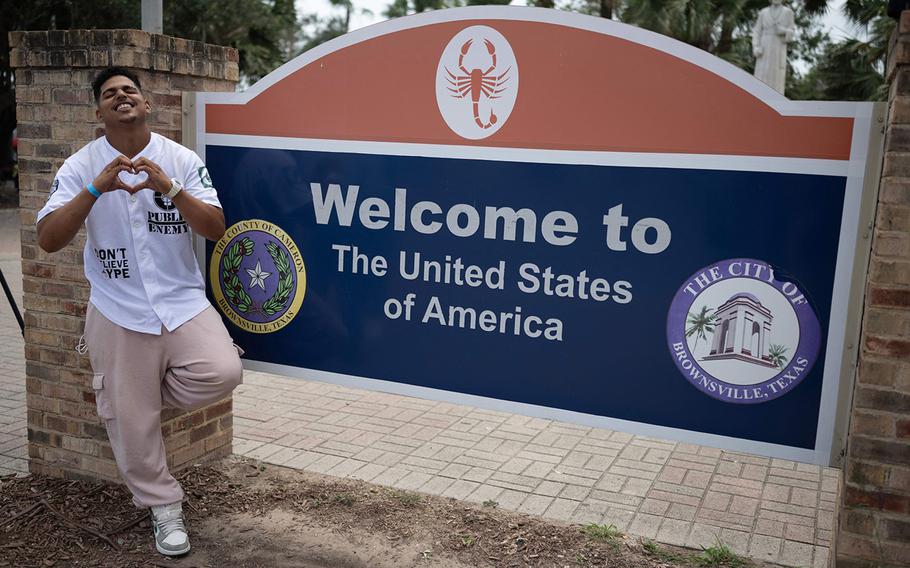
CBP personnel process and screen migrants using facial comparison software for possible entry into the U.S., on May 31, 2023 in Brownsville, Texas. (Jaime Rodriguez Sr./U.S. Customs and Border Protection)
(Tribune News Service) — On his way to the southern border, Jose Ramos spent six days wading through the treacherous stretch of jungle that connects South and Central America, known as the Darien Gap.
Ramos left his hometown in Venezuela to escape poverty — he was earning the equivalent of $10 a month there. He was taken in at the U.S. border and allowed to enter the country to await a hearing. When he arrived in metro Atlanta in August 2022, Ramos was “willing to take on any job, because when you come to this country, you can’t be picky.”
Because he crossed the border illegally, Ramos lacks work authorization and has been relying on under-the-table restaurant jobs to support himself.
Soon, migrants like Ramos will be able to establish a stronger financial foothold in Georgia and across the country.
Last week, the Biden administration announced it is extending temporary legal status to all Venezuelans who arrived in the U.S. on or before July 31, making them eligible for work permits and protection from deportation.
Nearly 500,000 Venezuelan nationals are expected to be covered by the humanitarian relief known as Temporary Protected Status (TPS) – historically granted to immigrants who hail from crisis-riddled countries. The status will last for at least 18 months.
Over 7 million migrants and refugees have fled Venezuela in recent years to escape political repression and poverty.
“I thank God that this country is opening doors for us. It’s a true blessing,” Ramos said. “I came to this country to contribute.”

U.S. Border Patrol agents assigned to El Paso Sector, El Paso Station intercept a group of approximately 127 migrants on March 7, 2019. (Jaime Rodriguez Sr./U.S. Customs and Border Protection)
The new TPS designation for Venezuelans came on the heels of calls from prominent Democrats in New York to make it easier for newly arrived migrants to work. Roughly 60,000 Venezuelans settled in New York and are straining local and state resources. Last year, Hispanic-serving organizations in Atlanta also reported a surge in Venezuelan arrivals to the metro area, but on a smaller scale.
Before last week’s TPS announcement, most Venezuelans who had managed to settle in the U.S. after unlawfully crossing the border sought to get on the path to achieving legal status by filing claims for asylum. Asylum seekers can apply for work permits, but there are long, mandatory waiting periods that draw the process out, keeping self-sufficiency out of reach for many.
With TPS, Venezuelans will be able to get their hands on work permits faster, and they will become less reliant on government services or under-the-table jobs.
According to NBC News, the U.S. Department of Homeland Security had previously shown reluctance to grant TPS to Venezuelans because it might spark a new migration influx. Restrictions on asylum rolled out by the Biden administration in May had slowed down illegal crossings at the border, but that trend has been reversed recently.
“It is critical that Venezuelans understand that those who have arrived here after July 31, 2023 are not eligible for [TPS], and instead will be removed when they are found to not have a legal basis to stay,” said Homeland Security Secretary Alejandro Mayorkas in a statement.
A Venezuelan migrant in his late 20s came to metro Atlanta after crossing the border last fall, and then relocated to Gainesville, where he now works without a work permit in a poultry processing plant.
He said the TPS announcement was the biggest topic of conversation last week at work, where many of his colleagues are also Venezuelan.
“The day after the news came out, we were talking among us Venezuelans about how big of an opportunity this was for us,” he said. “TPS gives you a [legal] status.” The poultry worker asked The Atlanta Journal-Constitution to withhold his name because he has been working illegally for months and is concerned that could jeopardize his pending asylum application.

Neiker Medina from Venezuela poses for a photo as he celebrates his arrival into the United States after obtaining an appointment to legally enter the country from Mexico on May 12, 2023, in Brownsville, Texas. (Andrew Caballero-Reynolds/AFP via Getty Images/TNS)
Vanesa Sarazua is the founder and executive director of Hispanic Alliance Georgia, a nonprofit based in Gainesville that aids immigrants.
She said having TPS – and timely access to work permits – will “change families’ lives.”
“Venezuelan migrants will be able to … better provide for their families.”
In Gainesville’s dominant poultry industry, unauthorized migrants without Social Security numbers are able to take meatpacking jobs through staffing agencies, a mechanism that helps shield companies from legal liability. Georgia law requires most employers to check new hires’ work eligibility using E-Verify, the U.S. government’s electronic verification system.
But relying on a staffing agency lowers workers’ take-home pay. Agencies “charge three bucks an hour off what you’re getting paid. And that’s on the low end,” Sarazua said.
Migrants with work permits can be hired by the poultry processing plants directly, bringing higher wages and better benefits.
According to Sarazua, not every Venezuelan migrant eligible for TPS will be able to speedily receive legal status, especially in Georgia. Many migrants will need outside help to file TPS applications, and pro-bono legal aid is limited in the state. There will likely also be cost barriers at play, since, for most applicants, the TPS filing fee is $545.
“That’s a big worry,” she said. “I can see many people remaining in limbo for a while.”
©2023 The Atlanta Journal-Constitution.
Visit at ajc.com
Distributed by Tribune Content Agency, LLC.